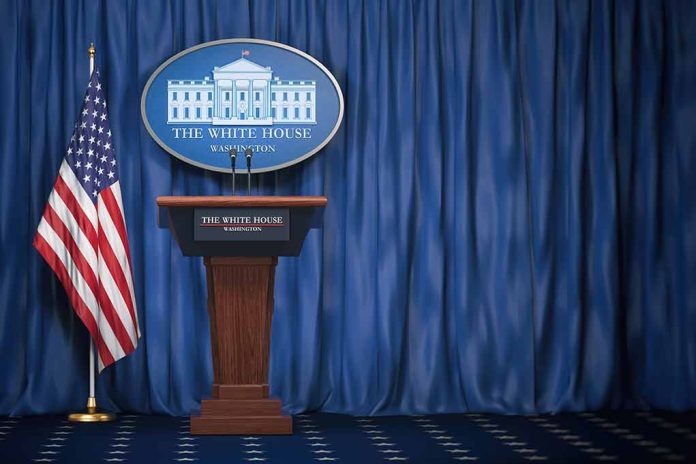
President Donald Trump confronts a reporter over media bias and January 6 pardons, highlighting ongoing tensions between the press and conservative figures.
Key Takeaways
- Trump criticized a reporter for repeated interruptions during a press conference, accusing the media of bias.
- The confrontation arose from questions about pardons for individuals involved in the January 6, 2021 riot.
- Trump claimed the American public is tired of biased reporting, citing his election results as evidence.
- The president accused reporters and district attorneys of focusing on political opponents rather than addressing violent crime.
- This incident underscores the continuing contentious relationship between Trump and the mainstream media.
Trump Clashes with Reporter Over Interruptions and Bias
During a recent press conference, President Donald Trump found himself embroiled in a heated exchange with a reporter. The incident, which occurred while Trump was discussing crime, quickly escalated when the reporter began questioning him about pardons related to the January 6, 2021 riot at the U.S. Capitol. Trump’s frustration with the interruptions became evident as he attempted to address the reporter’s queries.
As the exchange grew more intense, Trump directly confronted the reporter’s behavior. The former president’s words reflected his longstanding criticism of what he perceives as media bias against him and his supporters.
Trump puts reporter in his place when he tries to interrupt his answer:
Trump: "Listen to me for a second, stop interrupting."
Reporter: "I apologize." 🤣 pic.twitter.com/A6A8nUT9Op
— Libs of TikTok (@libsoftiktok) January 21, 2025
This confrontation serves as a stark reminder of the ongoing tension between Trump and members of the press, a relationship that has been characterized by mutual distrust and accusations of unfair treatment since Trump’s first term.
Public Sentiment and Media Bias
Trump seized the opportunity to argue that the American public is growing increasingly frustrated with what he views as biased reporting. He pointed to his electoral performance as evidence of this sentiment, suggesting that his political success is a direct result of public dissatisfaction with the media.
“We won this election in a landslide, because the American public is tired of people like you that are just one-sided, horrible people, in terms of crime.” This statement reflects a common sentiment among Trump’s supporters, who often express frustration with mainstream media narratives. The president’s assertion suggests a deep divide between his base and traditional news outlets, highlighting the polarized nature of the current media landscape.
Focus on Crime and Political Targeting
During the heated exchange, Trump shifted the conversation to broader criticisms of news coverage. He accused reporters of disproportionately focusing on political figures while ignoring violent crimes affecting communities across the nation. This criticism extended beyond the media to include district attorneys, whom Trump alleged were prioritizing political prosecutions over addressing street crime. “Murderers get no time. You take a look at some of these DAs, they go after political opponents, but they don’t go after people that shoot people in the street.”
This allegation touches on a contentious issue in current American politics, where concerns about rising crime rates in some cities have become a focal point for conservative criticism of progressive criminal justice policies. Trump’s comments suggest a belief that media coverage and law enforcement priorities are misaligned with the concerns of ordinary citizens.
Implications for Future Media Relations
The confrontation between Trump and the reporter underscores the enduring tensions between the president and the press. As Trump continues to shape his office, these interactions are likely to remain a significant aspect of his political discourse. The incident raises questions about the role of media in political coverage and the challenges of maintaining objectivity in an increasingly polarized environment.
For Trump supporters, this exchange may reinforce their perception of media bias and strengthen their allegiance to alternative news sources. Conversely, critics of the president may view this as further evidence of his combative relationship with the press. As the political landscape continues to evolve, the dynamics between political figures, the media, and the public will undoubtedly remain a critical area of focus and debate.
Sources:
Trump Blasts Reporter To His Face: America Tired Of ‘Horrible People’ Like You



